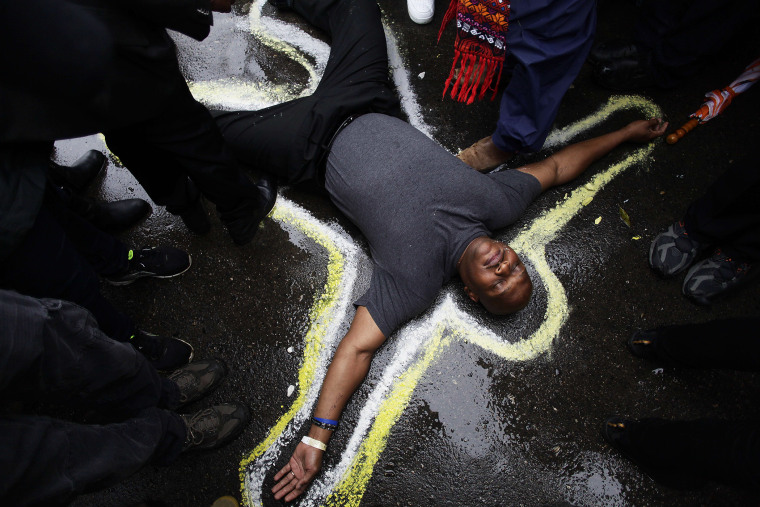A flyer sent by Georgia Democrats is making headlines for using the unrest in Ferguson, Missouri, to urge blacks to vote. But the attention only underscores the surprisingly low profile that Ferguson has had so far in the midterms.
After the August shooting of unarmed teen Michael Brown by a Ferguson police officer sparked weeks of angry and sometimes violent protests, African-American political leaders and organizations have seized on the tragedy — and the epidemic of police violence it underscores — to mobilize minority voters. But in terms of the mainstream campaign debate that most voters hear, Ferguson has barely penetrated.
RELATED: No surge in Ferguson voter registration after all
"It's really not an issue overall," said one leading Democratic pollster who asked to remain anonymous. "But it is an issue that's playing some role in African-American turnout efforts."
The Georgia Democratic Party flyer,
posted online Tuesday by the
Atlanta Journal-Constitution, shows two young black children holding signs saying "Don't Shoot." The main text reads: "If you want to prevent another Ferguson in their future ... vote." On the back, it notes that though blacks make up two-thirds of Ferguson's population, its government and police force is
overwhelmingly white.
A spokesman for the state party declined to say how broadly the flyer was sent, but campaign mailings can easily be targeted to specific demographics. Georgia hosts a competitive Senate race, in which Democrat Michelle Nunn is counting on high African-American turnout to propel her past Republican David Perdue.
"It’s really not an issue overall. But it is an issue that’s playing some role in African-American turnout efforts."'
“Ferguson has made it crystal clear to the African-American community and others that we’ve got to go to the polls,” Democratic Georgia
Rep. John Lewis told The New York Times in late August. “You participate and vote, and you can have some control over what happens to your child and your country.”
Donna Brazile, a veteran Democratic operative and DNC official, has conveyed a similar sentiment. “We have to be passionate about the upcoming election,” Brazile, who is black, tweeted in August. “We have to feel it matters, that our vote matters. We have to own it.” She added the hashtag #Ferguson.
The Congressional Black Caucus has also organized events where members have cited Ferguson, along with restrictions on voting rights and other issues, to urge black voters to the polls.
"There are other issues that are more important to most people," said the Democratic pollster. "Social Security, education, equal pay for women, shipping jobs overseas, you're speaking to a much larger audience." But he acknowledged that might not be the only reason. Polls suggest that by talking about the issue, Democrats risk turning off many of the white swing voters they need to win over.
One concrete policy issue arising from Ferguson — the militarization of local police forces — has gained a foothold in the national debate. Congress has held hearings on how to reverse the trend, and Sen. Rand Paul (R-Ky.), a leading potential presidential contender, has championed the cause.
Ferguson itself has seen a
burst of political activism since the shooting. Local black leaders have waged a campaign to mobilize young minority voters and ultimately change the face of the city's government.
Republicans, perhaps wary of an issue that could stoke African-American turnout, have looked to get out ahead of any effort by Democrats to embrace Ferguson. "What happened in Ferguson was not in any way a political issue," John Feehery, a Washington lobbyist and former top GOP congressional aide,
wrote last month. "There were no Senate votes on the issue, no crime control packages on the Senate docket, and no federal issues involved whatsoever."
